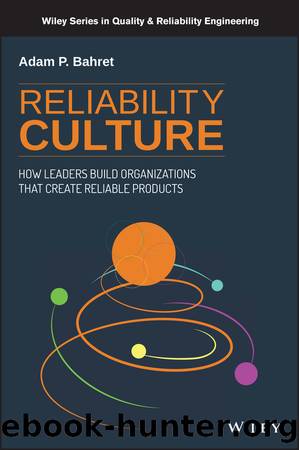Reliability Culture by Adam P. Bahret

Author:Adam P. Bahret [Bahret, Adam]
Language: eng
Format: epub
ISBN: 9781119612452
Publisher: Wiley
Published: 2021-01-30T00:00:00+00:00
There is also the scenario where leadership trusts the czar but feels they are not providing valuable information. Like when my daughter used to interrupt me when I was on an important conference call to tell me things like, âSome cats like milk but Nicole just said her new kitten won't drink milk.â
I am sure that is a factually correct piece of information but talking with the VP on the other end of this call about why the FDA wants to know why our âessential performance factorsâ don't match the definition in Standard 60601 is the conversation I need to be having right now⦠I just say, âHold on. That's really unusual, honey.â Steve's either not going to take my counsel too seriously going forward or wonder why I called him âhoney.â
Leadership has skin in the game with having the czar because they are potentially creating some strain with their direct team. The czar is someone providing information that their team cannot easily control or filter. The return must exceed the cost to be maintained.
For leadership I can't give any specific guidance on what to do. It is simply a personal call if you want this role to continue in your operation. It may have greater value in some programs than others. With regard to the value of the czar to leaders it is up to you to monitor and adjust if they perceive the role as valuable. One metric to monitor is the push vs. the pull of information. It is a valuable relationship if leadership is âpullingâ information. If the relationship transitions to the czar âpushingâ information on leadership then it needs to be reâevaluated and adjusted before it is terminated.
I discussed this dynamic a bit in an earlier section but it is worth reviewing again. The difference between a leader âpullingâ information and having it âpushedâ is simply this: if leadership is âpullingâ information, a majority of what the czar is sharing is based on requests, from leadership. If the czar is providing standardized reports to leadership for most sessions then they are âpushingâ information. I was once told by a mentor that unsolicited advice is of little value. It is only serving the person giving it. Advice you have solicited is what you want and so has high value. This is very relevant to this relationship because it is a relationship based on advisement.
Download
This site does not store any files on its server. We only index and link to content provided by other sites. Please contact the content providers to delete copyright contents if any and email us, we'll remove relevant links or contents immediately.
What's Done in Darkness by Kayla Perrin(25499)
Shot Through the Heart: DI Grace Fisher 2 by Isabelle Grey(18218)
Shot Through the Heart by Mercy Celeste(18160)
The Fifty Shades Trilogy & Grey by E L James(17774)
The 3rd Cycle of the Betrayed Series Collection: Extremely Controversial Historical Thrillers (Betrayed Series Boxed set) by McCray Carolyn(13189)
The Subtle Art of Not Giving a F*ck by Mark Manson(12908)
Scorched Earth by Nick Kyme(11831)
Stepbrother Stories 2 - 21 Taboo Story Collection (Brother Sister Stepbrother Stepsister Taboo Pseudo Incest Family Virgin Creampie Pregnant Forced Pregnancy Breeding) by Roxi Harding(11038)
Drei Generationen auf dem Jakobsweg by Stein Pia(10216)
Suna by Ziefle Pia(10185)
Scythe by Neal Shusterman(9259)
International Relations from the Global South; Worlds of Difference; First Edition by Arlene B. Tickner & Karen Smith(8608)
Successful Proposal Strategies for Small Businesses: Using Knowledge Management ot Win Govenment, Private Sector, and International Contracts 3rd Edition by Robert Frey(8418)
This is Going to Hurt by Adam Kay(7693)
Dirty Filthy Fix: A Fixed Trilogy Novella by Laurelin Paige(6450)
He Loves Me...KNOT by RC Boldt(5804)
How to Make Love to a Negro Without Getting Tired by Dany LaFerrière(5378)
Interdimensional Brothel by F4U(5303)
Thankful For Her by Alexa Riley(5159)
